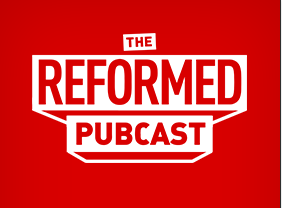This page has moved»
Covenant of Grace
Office Hours: The Trinity And The Covenant Of Redemption (Part 1)
There are passages in Scripture such as Psalm 110, Hebrews 7, and John chapter 17 that reflect something of the eternal relationship between the persons of the Trinity and especially between the Father and the Son. In the Reformation some of our . . . Continue reading →
Abraham, Moses, And Circumcision
Introduction Since the early to mid-19th century, American evangelical Christianity has been largely dominated by a set of assumptions about the nature of redemptive history and the progress of revelation that may be called Baptistic. Not everyone who holds these assumptions or . . . Continue reading →
Witsius On What “I Will Be Your God” Means
That expression, to be God to any, in its full import, includes life eternal, For, when God becomes the sinner’s God, he then becomes to him what he is to himself. But, what is he to himself? Doubtless, the fountain of eternal . . . Continue reading →
The Abrahamic Covenant Unifies Redemptive History
During our senior year in high school (1978–79) three of us went to lunch. Our public high school had an open campus, meaning that we were permitted to come and go so long as we attended classes. We piled into a friend’s . . . Continue reading →
Theological Error Seeps In
Years ago, in the second house in which Mrs Heidelblog and I lived, water seeped into the basement every time it rained and it rained frequently. As the ground became soaked water would push in and up through the basement. We had . . . Continue reading →
Another Helpful Distinction: Filial Versus Servile Fear
I was fortunate to have been raised in a two-parent family. I had a great Dad. I had what today would be considered an “old school” upbringing. Mom did most (maybe all) of the spanking but Dad made his presence felt. There . . . Continue reading →
The Synod Of Dort On Election, Conditions Of Salvation, And Fruit (2)
Does The Doctrine Of Perseverance Turn The Covenant Of Grace Into A Covenant of Works?
Here the true nature of the Remonstrant doctrine of perseverance emerges: God helps those who help themselves by cooperating with his “assisting grace.” This is quite another picture of salvation. Here God has not parted the Red Sea and led us through, by the hand, as it were (Jer 31:32; Ex 14:16). Rather, according to the Remonstrants, God has covenanted to co-act with those who do what lies within them (facientibus quod in se est, Deus non denegat gratiam). Continue reading →
An Important Distinction Between Kinds And Functions Of Conditions
When we use the word “condition,” the first sense that probably comes to mind, in English usage, is the first definition offered by the Oxford English Dictionary: “convention, stipulation, proviso.” There is another sense to the word, however, as it was used . . . Continue reading →
The Synod Of Dort On Election, Conditions Of Salvation, And Fruit (1)
The Reformed churches have endured discussions and disagreements about salvation (justification, sanctification, and deliverance from the wrath to come) before. Beginning in the late 16th century a Reformed minister in Amsterdam began offering significant revisions of the Reformed understanding of Scripture. Early . . . Continue reading →
Through Good Works? (2)
In order to understand properly what Calvin wrote we need to put these passages in context. Chapter 21 is about the relations between justification and sanctification, which he called the “progress” of justification. In other words, for Calvin, the definitive act of God in declaring sinners righteous, on the basis of the imputation of Christ’s righteousness, which is received through faith alone, results in the gradual sanctification of the Christian. Continue reading →
Through Good Works? (1)
Introduction In Reformed theology the noun salvation is typically used in two ways. Sometimes it is used as a synonym for justification. When used this way it does not include sanctification since, according to the Reformed confession, justification is a declarative act . . . Continue reading →
John Brown of Haddington On Conditions In The Covenant Of Grace
When condition is improperly taken, and signifies no more than what particular duties as performed must, in the order of nature, precede the enjoyment of particular promised benefits, many things may be called conditions; for holiness must precede eternal happiness…. True repentance . . . Continue reading →
Resources On Conditions In The Covenant Of Grace (Updated)
Some thoughts relative to the current discussion about the nature of conditions in the covenant of grace: First, we cannot get this right unless we distinguish between the covenant of works and the covenant of grace. Part of the problem in this . . . Continue reading →
Heidelberg 126: Justified Sinners Pray For Forgiveness Of Sins
One of the most persistent temptations Christians face is that of turning the covenant of grace into a covenant of works. As we pray we must always be reminded that we, who trust in Jesus Christ as our substitute and Mediator, are . . . Continue reading →
On The Reformed Pubcast Discussing Covenant Theology
Covenant theology is sometimes regarded and presented by American evangelicals as an idiosyncratic, mysterious, even esoteric way to read Scripture. Of course, from a historical and biblical perspective, it is nothing of the sort. Much of what the Reformed began to teach . . . Continue reading →
A Brief History Of Covenant Theology
The roots of Reformed covenant theology are as deep as the Christian revelation and tradition is old. Its importance to the Reformed faith cannot be overstated. The great Princeton theologian, B. B. Warfield called federal (covenant) theology, “architectonic principle” of the Westminster . . . Continue reading →
Heidelberg 82: The Jeopardy Of The Supper
82. Are they then also to be admitted to this Supper who show themselves by their confession and life to be unbelieving and ungodly? No, for thereby the covenant of God is profaned and His wrath provoked against the whole congregation; wherefore . . . Continue reading →
WCF: The Condition Of The Covenant Of Works Versus The Condition Of The Covenant Of Grace
1. The distance between God and the creature is so great, that although reasonable creatures do owe obedience unto him as their Creator, yet they could never have any fruition of him as their blessedness and reward, but by some voluntary condescension . . . Continue reading →
Heidegger And Turretin: Adam’s Covenant Of Works Fulfilled By Christ
Canon VII: As all his works were known unto God from eternity, (Acts 15:18), so in time, according to his infinite power, wisdom, and goodness, he made man, the glory and end of his works, in his own image, and, therefore, upright, . . . Continue reading →












